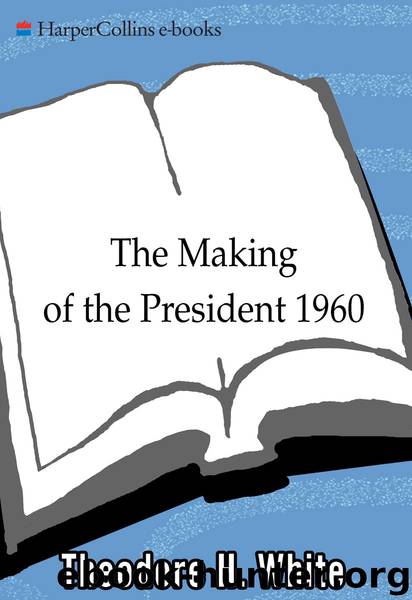The Making of the President 1960 by Theodore H. White & Theodore H. White

Author:Theodore H. White & Theodore H. White
Language: eng
Format: epub
Publisher: HarperCollins
Published: 1960-12-31T16:00:00+00:00
All these campaigns—those of Humphrey, of Symington, of Johnson—were thus, by the end of 1959, organizations in being, shapeless perhaps, yet captained by men who meant to be President of the United States and staffed by in-groups of three, five or ten men, whose lives and ambitions were now devoted to no other purpose.
At the end of 1959 there remained another man, uncertain, willing yet unwilling to be President, who was seven months later to be John F. Kennedy’s chief rival for the Democratic nomination. He was Adlai E. Stevenson, whose motives and intentions no man could read—probably, at that point, not even himself.
To the outer eye, and even to his family and intimates, Adlai Stevenson was by 1959 a happy man. He had returned to Libertyville, Illinois, and his old farm house after the 1952 campaign, a lonely and melancholy man—defeated in election, his marriage broken, his children away at school, his home strange to him after being rented out for many years. The years between 1952 and 1956 he had spent with more than half a hankering for the Democratic nomination of 1956 and a deep sense of obligation to the party that had gone so deeply in debt on his behalf. With his defeat in 1956, however, a more philosophical turn seems to have come over him. Now his son Adlai Jr. lived just down the road from him; and young Adlai and his sweet wife, Nancy, would visit with the children on week ends. Home life was mending. Stevenson loved Libertyville and the quiet sound of the trees rustling when in summer, in blue sneakers and blue shorts, he would sun himself on the lawn. He slept in his own bed at his own choice; dignitaries and scholars from all the world made pilgrimages to his home; he could dash off to New York to taste the metropolitan excitement of the big city when and as he chose; and his trips around the world as a journalist kept him acquainted with great affairs of state at the level he preferred.
If this happy and placid man gave political calculators an impression of total schizophrenia, the reason was a simple one—Adlai Stevenson was and, I believe, remains torn in attitude to the two great systems of power that mesh in the unity of the American Presidency. Stevenson’s attitude to public affairs approaches a nobility rarely encountered in the political system of any country; but his attitude to politics—the grubby, rooty politics of noise and deals and cruelties and chicaneries—is one of contempt. Yet public affairs and politics are linked as are love and sex. Stevenson’s attitude to politics has always seemed that of a man who believes love is the most ennobling of human emotions while the mechanics of sex are dirty and squalid.
This seemed to be the quality of his reflections. “Deep down,” said his closest friend during the winter months of 1959–1960, “he wants it. But he wants the Convention to come to him, he doesn’t want to go to the Convention.
Download
This site does not store any files on its server. We only index and link to content provided by other sites. Please contact the content providers to delete copyright contents if any and email us, we'll remove relevant links or contents immediately.
| Anthropology | Archaeology |
| Philosophy | Politics & Government |
| Social Sciences | Sociology |
| Women's Studies |
The Secret History by Donna Tartt(18996)
The Social Justice Warrior Handbook by Lisa De Pasquale(12176)
Thirteen Reasons Why by Jay Asher(8873)
This Is How You Lose Her by Junot Diaz(6855)
Weapons of Math Destruction by Cathy O'Neil(6248)
Zero to One by Peter Thiel(5762)
Beartown by Fredrik Backman(5707)
The Myth of the Strong Leader by Archie Brown(5479)
The Fire Next Time by James Baldwin(5409)
How Democracies Die by Steven Levitsky & Daniel Ziblatt(5198)
Promise Me, Dad by Joe Biden(5127)
Stone's Rules by Roger Stone(5065)
A Higher Loyalty: Truth, Lies, and Leadership by James Comey(4937)
100 Deadly Skills by Clint Emerson(4898)
Rise and Kill First by Ronen Bergman(4757)
Secrecy World by Jake Bernstein(4725)
The David Icke Guide to the Global Conspiracy (and how to end it) by David Icke(4682)
The Farm by Tom Rob Smith(4484)
The Doomsday Machine by Daniel Ellsberg(4472)
